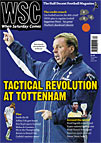 David Davies witnessed more than a decade of controversy and change at the FA, but his new book seems to have missed out all the interesting bits. Taylor Parkes reads between the lines
David Davies witnessed more than a decade of controversy and change at the FA, but his new book seems to have missed out all the interesting bits. Taylor Parkes reads between the lines
Not so long ago – for old times’ sake – I found myself stumbling drunkenly through Soho Square. Pausing, as ever, to peer in through the FA’s window, I noticed a slogan on the foyer wall, right next to the three lions: “A world class organisation with a winning mentality.” I laughed, and choked, and walked on. But I remember wondering how this happened – how the FA morphed from an affluent impression of Last of the Summer Wine into something resembling a consultancy firm, brisk and businesslike (if still bungling), pinning up pointless and insulting motivational slogans. I hoped that FA Confidential, by former spin doctor and acting chief executive David Davies, might provide some explanation.
Advance publicity, and that cheeky little title, suggested the book was some sort of scandal sheet. In truth, this is just David Davies’s autobiography (posing as an exposé to get round the niggling fact that not one person, anywhere in the world, would buy David Davies’s autobiography), and its power to shock, or even surprise, is rather limited. The “bombshell” here, already plastered across the papers, involves the FA being offered votes for cash during its bid for the 2006 World Cup. Not only is this about as surprising as rain in April, it’s a duff story – clearly Davies knows who was responsible, but refuses to name names. What we’re left with is what the FA has, in a subsequent press release, called “an anecdotal story by someone who left the organisation two years ago about a phonecall to someone [Adam Crozier] who left the organisation six years ago, from an unnamed individual who was not on FIFA’s executive committee”. So much for that.
All Davies’s would-be whistle-blowing is compromised by his ongoing insider status, and subsequent reluctance to let rip. He’s laughably protective of other FA figures, even those who hated him: “football always needs men like Ken Bates”, he remarks, a baffling statement to be sure, doubly so in light of Bates’s frequent calls for his dismissal. And Davies’s own judgment is hardly unimpeachable – he is best known for co‑authoring Glenn Hoddle’s World Cup diary. On that score, we get pages of exhaustive self-justification, followed by an admission that “writing that World Cup diary was my biggest mistake”. This becomes a familiar pattern. Countless times, Davies recounts some fresh calamity, explains why he acted honourably, then concludes: “Was I wrong? Probably.” And there are foolish moves he still won’t admit to: not only is he proud of that disgraceful decision to postpone matches after Princess Diana’s death (and the pressure he put on a reluctant SFA to follow suit), it seems he tried to persuade Elton John to sing Candle in the Wind before England’s subsequent game against Moldova. Tragically, Elton was unavailable.
Indeed, most of the eye-openers here say more about Davies himself than the machinations of the FA. Sometimes you have to admire his resourcefulness: while working as a journalist for the BBC’s Look North, he was sent to cover the Birmingham Six being led from the police station in Morecambe. Alas, the camera jammed, so David rang the detective chief superintendent, who arranged for six coppers to be led out with blankets over their heads and shoved in a police van, and Davies’s team filmed that. This is, presumably, the clip the BBC uses to this day. More often, you can’t help but wince. Tony Adams pours out his heart on how grim it was in prison: “I can understand,” replies David. “I’ve done films in there.” Terry Venables steps down, and the two men share a heart-rending farewell: “‘Thanks for the journey,’ I said. ‘We’ll always be friends.’ ‘Always’, said Terry.” Conversely, after one irksome TV appearance, he “wanted to punch Basil Brush in the throat”.
What this book does tell you about the Football Association is what you already knew: it is a hotbed of absurdity, in which a man such as Davies can seem sensible and pragmatic. Graham Kelly opening everyone’s post, Hoddle engrossed in his horoscope (“‘very accurate’, he told me”), Tord Grip becoming so angry he “threw a banana across the room”, the thirsty Eileen Drewery, starry-eyed Faria Alam (“she loved it when Sir David Frost pulled up outside Soho Square in his Rolls-Royce and popped in for a cup of tea”), a duplicitous Sven and the attendant Whitehall farce. After the riot at Ireland v England in 1995, with the media in uproar, the FA’s email system clogs up because committee member Percy Rushden has lost his raincoat and is demanding everyone down tools and look for it (Mr Rushden was, of course, “a great character”). Most mind-boggling of all is Alan Shearer’s indignance at the prospect of punishment for kicking Neil Lennon in the head – Shearer felt he was “being victimised because he is England captain”. Yes. Seriously.
Against this backdrop, Davies seems more reasonable than he otherwise might, and it’s easy to sympathise with his struggles against sundry cobwebbed buffoons. The problem is that what little change he was able to effect was not entirely for the better; his (admittedly cautious) support of Game 39 leaves little doubt as to his side of the fence. It’s the introduction of corporate thinking to the FA’s fusty inertia that is, perhaps, his real legacy. If we believe all we read here, it was David Davies who transformed the FA, almost single-handed, from wheezing anachronism to modern nightmare. Quite an achievement, I suppose – if stepping sideways counts as progress.
FA Confidential, Simon & Schuster, £17.99
From WSC 262 December 2008